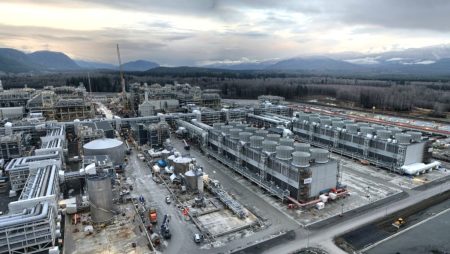24 September 2014, Lagos – The global market for shale gas is expected to reach $67.02bn by 2020 and Nigeria appears not to have plans to leverage the development for economic advancement.
Currently, the country is struggling with models to harness its natural gas reserves and projects like the Nigeria Liquefied Natural Gas Train 7, Brass LNG, Olokola LNG.
 The continuous postponement of the Final Investment Decisions for the projects, according to analysts, further emphasises the inability of stakeholders in the oil and gas sector to get them off the ground.
The continuous postponement of the Final Investment Decisions for the projects, according to analysts, further emphasises the inability of stakeholders in the oil and gas sector to get them off the ground.
There is, however, the fear that the delay may result in the plants not having market for their products.
Shale gas is natural gas that is found trapped within shale rock formations. It has become an increasingly important source of natural gas in the United States since the start of this century, and its interest has spread to other countries of the world.
In 2000, shale gas provided only one per cent of the US natural gas production; by 2010, it was over 20 per cent and the US government’s Energy Information Administration predicts that by 2035, 46 per cent of the country’s natural gas supply will come from shale gas.
Prior to the growth of the shale gas market, the US was the leading importer of Nigeria’s crude oil.
Experts say the Nigerian economy is not only facing obvious threats from dwindling revenue from crude oil sales, theft and pipeline vandalism; but also from the anticipated impact, which the discovery of shale gas will have on the country’s economy since the US has cut down drastically its crude oil imports from the country.
The Chairman/Chief Executive Officer, M E Consulting Limited and a former Chief Financial Officer, Nigeria LNG Limited, Mr. Victor Eromosele, said a major problem that would confront the gas from the planned Nigerian plants if they ever took off would be the increasing drop in the price of the product at the international market, as shale gas from the US and other discoveries elsewhere might make gas from the plants unattractive.
He stated that the price of gas at the international market had started dropping and this, coupled with major discoveries of gas across Africa and the world, might sooner or later impact negatively on revenue from the Nigerian plants.
The global market for shale gas is expected to reach $67.02bn by 2020, according to a new study by Grand View Research, Incorporated. Depleting conventional energy reserves across the globe have prompted the industry to shift focus towards developing alternative energy sources, which are expected to remain a key driving factor for shale gas demand over the next six years.
In addition, regulatory support for developing unconventional gases, including shale, is also expected to enhance commercialisation over the forecast period.
The Nigeria National Petroleum Corporation had officially admitted that the business environment in the international energy scene was evolving with regard to the development of shale gas in the US as well as the increasing competition from traditional oil producers like Angola and new ones such as Ghana, Ethiopia, Kenya, Uganda and others.
The NNPC said it was currently propelling its Business Development Directorate to lead the charge in developing strategies to take advantage of the opportunities offered by the changes.
The director in charge of the directorate has been mandated to build the necessary capabilities and skills, and seek collaboration from within and outside the NNPC business ecosystem in order to fulfil the mandate.
However, power generation emerged as the leading application market for shale gas and accounted for 30.4 per cent of total market volume in 2013.
Environmental concerns regarding power generation via conventional energy coupled with regulatory support for development of unconventional energy sources for power generation are expected to remain a key driving factor over the forecast period for shale gas
– The Punch



